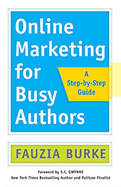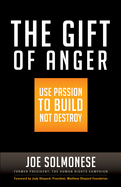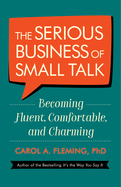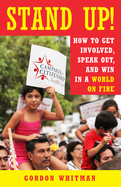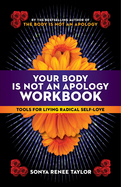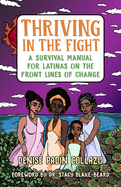Search Results: "Social Venture Networks/books/marketing-that-matters.htm"
Results 163-168 of 345
If You Want People to Read Your Book,
Writing It Is Only the Beginning
There has truly never been a better time to be an author. For the first time, authors have direct access to the public via the Internet—and can create a community eagerly awaiting their book. But where do new authors start? How do they sort through the dizzying range of online options? Where should they spend their time online and what should they be doing?
Enter Fauzia Burke, a digital book marketing pioneer and friend of overwhelmed writers everywhere. She takes authors step-by-step through the process of identifying their unique personal brand, defining their audience, clarifying their aspirations and goals, and setting priorities. She offers advice on designing a successful website, building a mailing list of superfans, blogging, creating an engagement strategy for social media, and more. By following Burke's expert advice, authors can conquer the Internet and still get their next manuscript in on time.
Writing It Is Only the Beginning
There has truly never been a better time to be an author. For the first time, authors have direct access to the public via the Internet—and can create a community eagerly awaiting their book. But where do new authors start? How do they sort through the dizzying range of online options? Where should they spend their time online and what should they be doing?
Enter Fauzia Burke, a digital book marketing pioneer and friend of overwhelmed writers everywhere. She takes authors step-by-step through the process of identifying their unique personal brand, defining their audience, clarifying their aspirations and goals, and setting priorities. She offers advice on designing a successful website, building a mailing list of superfans, blogging, creating an engagement strategy for social media, and more. By following Burke's expert advice, authors can conquer the Internet and still get their next manuscript in on time.
The Gift of Anger
2016
Under Joe Solmonese's leadership, the Human Rights Campaign became the model other organizations look toward to create effective social and political change. Against daunting odds, HRC was instrumental in passing landmark national legislation such as the Matthew Shepard and James Byrd, Jr., Hate Crimes Prevention Act; repealing “Don't Ask, Don't Tell”; and passing marriage equality acts in eight states. How did Solmonese and HRC do it?
What Solmonese reveals in this book is that for him, the key to success was learning to harness his anger. Essentially it's just a form of energy. Channeled, it can keep you moving forward on a long journey. But uncontrolled, it can blow everything up.
With this as his guiding principle, Solmonese uses stories from his work with HRC and his previous position as CEO of the powerful women's organization EMILY's List to share a series of often-surprising lessons. For example, empathize with your enemies instead of shaming them, find allies wherever you can, and ask for the doable, not the impossible (even when the “impossible” is your ultimate goal). Most striking in this book are the stories of Solmonese's ability to draw some kind of win—however small—from seeming adversaries.
But at every step of the way he emphasizes the importance of managing the yin-yang tension of anger. Particularly when one is dealing with irrational and offensive attitudes, the temptation is ever present to give in to righteous indignation. While it's fine to feel it, Solmonese's advice is to always be strategic with your outrage.
What Solmonese reveals in this book is that for him, the key to success was learning to harness his anger. Essentially it's just a form of energy. Channeled, it can keep you moving forward on a long journey. But uncontrolled, it can blow everything up.
With this as his guiding principle, Solmonese uses stories from his work with HRC and his previous position as CEO of the powerful women's organization EMILY's List to share a series of often-surprising lessons. For example, empathize with your enemies instead of shaming them, find allies wherever you can, and ask for the doable, not the impossible (even when the “impossible” is your ultimate goal). Most striking in this book are the stories of Solmonese's ability to draw some kind of win—however small—from seeming adversaries.
But at every step of the way he emphasizes the importance of managing the yin-yang tension of anger. Particularly when one is dealing with irrational and offensive attitudes, the temptation is ever present to give in to righteous indignation. While it's fine to feel it, Solmonese's advice is to always be strategic with your outrage.
Small Talk Is the Single Most Important Communication Skill You Can Develop
Carol Fleming wants to show you that small talk is not as “small” as you might think. It's the foundation of every relationship, professional and personal. It is the sound of people reaching out to each other, searching for similarities, shared interests, goodwill, connections, and friendship. And it's something we all do every day with people we know. It's just the one little bit about strangers that throws some people off. Graceful social conversation can be learned, even by those requiring the smallest of baby steps.
Fleming covers the inner and outer aspects—from the right attitude to how to dress, move around, and introduce yourself. Most importantly, she lays out a series of simple, memorable conversational strategies that make it easy to go from “Nice weather we're having” to a genuine, rewarding give-and-take. But she won't tell you what to say. Believe it or not, you already have what you need inside you. She merely provides the keys to unlock it.
Small talk is the language of welcome, the extension of friendliness, the gracious acknowledgment of others, the kindly exchange of introductions and smiles, and the creation of a safe, courteous social space—and this is what has you terrified? After you read this book, you'll wonder what all the fuss was about.
Carol Fleming wants to show you that small talk is not as “small” as you might think. It's the foundation of every relationship, professional and personal. It is the sound of people reaching out to each other, searching for similarities, shared interests, goodwill, connections, and friendship. And it's something we all do every day with people we know. It's just the one little bit about strangers that throws some people off. Graceful social conversation can be learned, even by those requiring the smallest of baby steps.
Fleming covers the inner and outer aspects—from the right attitude to how to dress, move around, and introduce yourself. Most importantly, she lays out a series of simple, memorable conversational strategies that make it easy to go from “Nice weather we're having” to a genuine, rewarding give-and-take. But she won't tell you what to say. Believe it or not, you already have what you need inside you. She merely provides the keys to unlock it.
Small talk is the language of welcome, the extension of friendliness, the gracious acknowledgment of others, the kindly exchange of introductions and smiles, and the creation of a safe, courteous social space—and this is what has you terrified? After you read this book, you'll wonder what all the fuss was about.
Stand Up!
2018
Stand Up!
How to Get Involved, Speak Out, and Win in a World on Fire
A society that actively combats racism, treats climate change as a serious threat, and ensures that all people have a living wage and a decent life for themselves and their families is not a progressive pipe dream. Victories are being won every day, all over the country. But they didn't happen just by clicking “donate” on a website. Gordon Whitman says that fundamental change demands forming the kind of face-to-face relationships that have sustained every social movement in history.
For two decades, Whitman has been working with PICO National Network to equip tens of thousands to fight racial discrimination and economic injustice. He brings that experience to this book, describing five kinds of conversations that enable people to create organizations that can successfully overcome the forces of oppression and reaction.
The first conversation to have is with ourselves, to make sure we're clear about our purpose and in it for the long haul. Then we need to share the personal story of how we came to this point with others—there is no more powerful way to connect. They in turn will share their stories, and then we can have the third conversation, about becoming a team. This team reaches out to people they know to talk about their concerns and priorities, building a broad base of supporters.. Then, with our base at our back, we can have that final conversation, directly confronting the powers that be.
Of course, this isn't as simple as it sounds. Appropriately enough, Whitman uses stories, his own and others, to illustrate how best to handle these conversations and to show how they work together to build a movement. We can't just sit on the sidelines sharing angry social media posts or signing online petitions. We need to get directly involved, reach out, knock on doors, and bring our whole selves to the table if the changes our country so desperately need are ever going to come.
How to Get Involved, Speak Out, and Win in a World on Fire
A society that actively combats racism, treats climate change as a serious threat, and ensures that all people have a living wage and a decent life for themselves and their families is not a progressive pipe dream. Victories are being won every day, all over the country. But they didn't happen just by clicking “donate” on a website. Gordon Whitman says that fundamental change demands forming the kind of face-to-face relationships that have sustained every social movement in history.
For two decades, Whitman has been working with PICO National Network to equip tens of thousands to fight racial discrimination and economic injustice. He brings that experience to this book, describing five kinds of conversations that enable people to create organizations that can successfully overcome the forces of oppression and reaction.
The first conversation to have is with ourselves, to make sure we're clear about our purpose and in it for the long haul. Then we need to share the personal story of how we came to this point with others—there is no more powerful way to connect. They in turn will share their stories, and then we can have the third conversation, about becoming a team. This team reaches out to people they know to talk about their concerns and priorities, building a broad base of supporters.. Then, with our base at our back, we can have that final conversation, directly confronting the powers that be.
Of course, this isn't as simple as it sounds. Appropriately enough, Whitman uses stories, his own and others, to illustrate how best to handle these conversations and to show how they work together to build a movement. We can't just sit on the sidelines sharing angry social media posts or signing online petitions. We need to get directly involved, reach out, knock on doors, and bring our whole selves to the table if the changes our country so desperately need are ever going to come.
Based on the New York Times bestseller The Body Is Not an Apology, this is an action guide to help readers practice the art of radical self-love both for themselves and to transform our society.
Based on the New York Times bestseller The Body Is Not an Apology, this is an action guide to help readers practice the art of radical self-love both for themselves and to transform our society.
Readers of The Body Is Not an Apology have been clamoring for guidance on how to do the work of radical self-love. After crowdsourcing her community, Sonya Renee Taylor found her readers wanted more concrete ideas on how to apply this work in a larger social and structural context. Your Body Is Not an Apology is the action guide that gives them just that-tools and structured frameworks they can apply immediately to start changing the world. Taylor guides readers with concrete ideas and, as always, practical applications that move us beyond theory and into doing and being radical self-love change agents in the world. This workbook, along with the new edition of the book, will put people in action in their organizations, in politics, in their doctor's offices, and at their jobs.
Based on the New York Times bestseller The Body Is Not an Apology, this is an action guide to help readers practice the art of radical self-love both for themselves and to transform our society.
Readers of The Body Is Not an Apology have been clamoring for guidance on how to do the work of radical self-love. After crowdsourcing her community, Sonya Renee Taylor found her readers wanted more concrete ideas on how to apply this work in a larger social and structural context. Your Body Is Not an Apology is the action guide that gives them just that-tools and structured frameworks they can apply immediately to start changing the world. Taylor guides readers with concrete ideas and, as always, practical applications that move us beyond theory and into doing and being radical self-love change agents in the world. This workbook, along with the new edition of the book, will put people in action in their organizations, in politics, in their doctor's offices, and at their jobs.
Social justice work is more crucial than ever, but it can be physically and emotionally draining. Longtime activist Denise Collazo offers three keys to help Hispanic women keep their focus, morale, and energy high.
Winner of the gold medal at the International Latino Book Awards for Best Latina-Themed Book and Best Self-Transformational Book!
Doing the work of social change is hard. Waking up every day to take on the biggest challenges of our time can be overwhelming, and sometimes progress is hard to see. She understands that Latina and all women of color activists do their best work when they are thriving, not simply surviving.
Denise Padín Collazo has been there. She is the first Latina, the first woman of color, and the first woman period to raise a family and stay in the work of community organizing at Faith in Action, an international progressive network of 3,000 congregations and 2 million members. Drawing on her own experiences of triumph and failure, and those of other Latina activists, Collazo lays out three keys to thriving in the movement for social change: leading into your vision, living into the fullest version of yourself, and loving past negatives that hold you back. She also warns about the three signs that you may be surrendering: wishing for a future reality to emerge, wondering where your limits are, and waiting for permission and answers to come from others.
Using this framework, Collazo offers wise and compassionate advice on some of the most important leadership challenges facing Latina activists. She explains how you can integrate family and work, step out of the background and claim your leadership potential, confront anti-Blackness in your own culture, keep focused on your ultimate purpose, and raise the necessary resources to keep fighting for justice. This honest, practical, and inspirational book will help Latina activists to burn bright, not burn out.
Winner of the gold medal at the International Latino Book Awards for Best Latina-Themed Book and Best Self-Transformational Book!
Doing the work of social change is hard. Waking up every day to take on the biggest challenges of our time can be overwhelming, and sometimes progress is hard to see. She understands that Latina and all women of color activists do their best work when they are thriving, not simply surviving.
Denise Padín Collazo has been there. She is the first Latina, the first woman of color, and the first woman period to raise a family and stay in the work of community organizing at Faith in Action, an international progressive network of 3,000 congregations and 2 million members. Drawing on her own experiences of triumph and failure, and those of other Latina activists, Collazo lays out three keys to thriving in the movement for social change: leading into your vision, living into the fullest version of yourself, and loving past negatives that hold you back. She also warns about the three signs that you may be surrendering: wishing for a future reality to emerge, wondering where your limits are, and waiting for permission and answers to come from others.
Using this framework, Collazo offers wise and compassionate advice on some of the most important leadership challenges facing Latina activists. She explains how you can integrate family and work, step out of the background and claim your leadership potential, confront anti-Blackness in your own culture, keep focused on your ultimate purpose, and raise the necessary resources to keep fighting for justice. This honest, practical, and inspirational book will help Latina activists to burn bright, not burn out.


